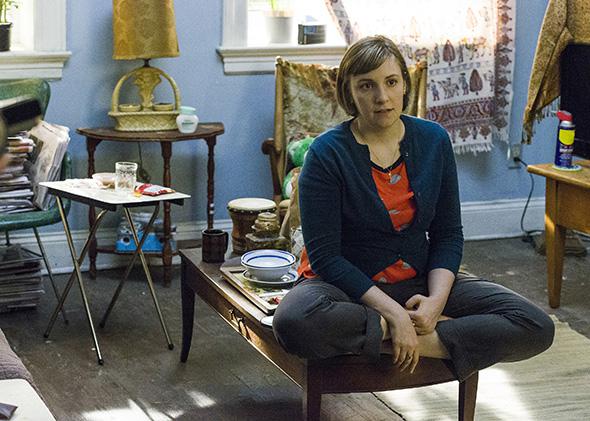Unlike Hannah Horvath, Lena Dunham has a knack for knowing exactly how and when to stop a story. Three times now, she’s concluded good and not-so-good seasons with clear-eyed, complex finales that manage to feel satisfying while leaving things appropriately open-ended. So it’s only fitting that Girls’ fourth season—the best since the show’s first—ended not with a bang, but with a birth. And a breakup. And a boyfriend.
The episode’s centerpiece was the home birth that Adam’s sister, Caroline, attempts to execute amid scented candles and strains of sitar music. After some hilarious debate and the painful debut of the child’s foot, Hannah, Jessa, and Adam physically carry Caroline to a hospital where the baby is safely delivered. There, Adam tells Hannah that he’s split from girlfriend Mimi-Rose and would like to get back together. Hannah says no. Adam insists he’s serious. Hannah still says no. And then, in a “six months later” coda, we see her and colleague Fran walking hand-in-hand through a snowy New York.
Until now, Girls was a fascinating case study in the myriad ways in which people stay the same. But in Sunday’s finale, as well as for most of the fourth season, Hannah is very clearly a changed person. She is not a writer, but a teacher. She admits, with uncharacteristic self-awareness, that “letting go doesn’t come very naturally to me.” When her dad comes out as gay, she notes that “this isn’t really about me.” And when Adam, whom she spends most of the season missing, proposes reuniting, she is immediate and assured in her refusal.
So what does Girls become when Hannah learns a lesson? In a word, better—not because her evolution, in and of itself, enhances the show, but because it allows for new, invigorating frontiers of character development. Rejecting Adam is a profoundly earned move by Hannah, but it’s also a breakthrough for Dunham, who has long sought a way to reconcile her alter ego’s ambitions and insecurities without resorting to caricature.
A large part of that breakthrough involves someone who wasn’t even in the finale: Mimi-Rose Howard, Adam’s erstwhile girlfriend and perhaps the show’s best ever supporting character. Dunham has described Howard as an artist who “lives her life as an emotional experiment,” but that doesn’t quite capture the character’s role in Girls’ narrative. Above all else, Mimi-Rose is a walking, talking critique of Hannah. Both characters share the same lofty artistic goals, the same obsessive introspection, and the same love of coconut popsicles—but where Hannah is nervous and needy, Mimi-Rose is calm and almost cruelly independent, the girl who doesn’t “need” Adam but who enjoys his affection after a long day at the studio.
In the season’s most pivotal scene, she and Hannah face off in a laundromat, and both confess to having little confidence in their art. It’s a beautifully wrought moment, and one that makes it clear that Mimi-Rose doesn’t merely live her life as an emotional experiment: The whole character is an emotional experiment, one that Dunham uses to help Hannah locate her own priorities and principles in a rare moment of frank self-appraisal. It’s that raw perspective that allows Hannah to turn down Adam, even though there’s no beckoning MFA or grand literary future to dull her pain. Hannah chooses not selfishness but self-possession, and that minute distinction makes her the most interesting person on the show again.
Unfortunately that comes at the cost of the supporting characters. Once upon a time, Girls’ great strength was how it leavened Hannah’s incessant, exhausting missteps with the lighter and more stimulating stories of Marnie, Shoshanna, and Jessa. No longer. At the close of Sunday’s finale, Jessa wants to be a therapist, Shoshanna has accepted a job in Japan, and Marnie has gone solo in her ill-advised music career. These arcs are good for laughs, but they’re all beats that have been hit before—Shoshanna’s job search, in particular, is an almost literal retread of Hannah’s workplace struggles last season. The problem isn’t that these characters are running in circles; it’s that they’re running in the same circles in the same ways.
And they’re not even running together. As this season increasingly fixed its lens on Hannah’s evolution, it became clear that the show’s early and intelligent exploration of female friendship is no longer a priority. I’m not even sure I’d call the eponymous girls friends anymore: They’re closer to a group of interconnected, resentful acquaintances, bound by some shared romantic interests and a truckload of horrible memories.
But maybe that, too, is appropriate. Maybe Hannah doesn’t need those friends as she once did, or maybe it’s just that friendships tend to fade. Moments before Hannah refuses to take Adam’s hand, when the two of them are playfully telling Caroline’s child about the wonders of being alive, she says: “I can’t guarantee perfection, but I can guarantee intrigue.” That seems like a solid encapsulation of where this show is headed. It also sounds like a lesson worth teaching.
